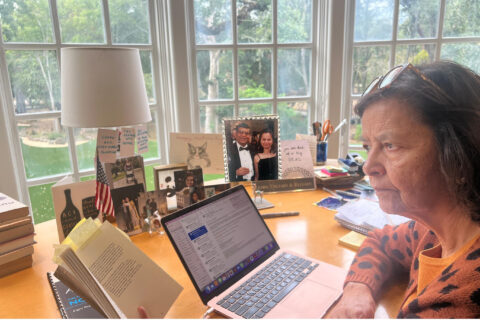
Connecting and networking have become buzzwords in business circles. Business schools aggressively promote them. LinkedIn, Facebook and Twitter are great ways to connect with business associates and friends, but are we spending too much time on connecting with other people and too little connecting with our own inner selves? Connecting with ourselves requires introspection. We have to strip off the veneers of mind to reach deep within us, where instincts, feelings, tendencies, experiences, and logic come together. It is essential for personal growth. Introspection can be cultivated through deliberate practice.
I had to rely on connecting more deeply with myself, when deciding to take the plunge to launch my own technology start-up, to overcome my fear. At the time, venture capital was less plentiful, and as an immigrant I lacked the connections or skills to raise money. That meant that our limited funds all had to be spent developing and manufacturing the product in the hope that customers would buy it. This was all-or-nothing proposal; if we ran out of money before we started generating sales, the company would not survive. Also along the way to overcome major obstacles of my partner’s departure, changing product direction and hiring executive team, required digging deeper within to navigate my path through the maze. This is perhaps the only secret sauce of entrepreneurship.
When we connect with ourselves, the fog starts to lift and focus shifts from anxiety to analyzing the problem. It is a process of growth even if results are not yet apparent. In my recent stint with bridge, a demanding mental game which I began playing at the age of 60, I had to reflect on how to attain superior performance quickly. Going from a novice player to winning several National Championships, required me to cultivate the power of inner thinking. It has been hard work, but consistency has improved with practice.
As a business leader, when I received my first invitations to speak in public forums, I did not speak with enough confidence. When I asked myself why, no answers surfaced. Then I asked more probing questions. Did I feel inadequate? Did I believe in what I was saying? Was I focused on how I was coming across? Was I focused on the subject matter or on the audience? As the questions were refined, the answers came to me. I started spending more time preparing the material, sharing my experiences and turning my focus from myself to the audience.
Practice is hard work. I did my final rehearsal while driving to the presentation, when I could listen to myself speak one last time. By listening to myself I discovered flaws in the flow of my sentences or dots that weren’t connected. Sometimes my choice of words or my tone weren’t quite right. Even executive coaches sometimes miss these feedback cues.
Connecting with ourselves also requires being in touch with our feelings. The philosopher Peter Koestenbaum states “..Stay with the feeling. Think of it as a precious source of knowledge and guidance..” This connects the dots for each one of us, uniquely.
This endeavor requires training the mind. Yoga techniques like deep breathing is analogous to stretching and relaxing the brain, increasing its capability to absorb. Different parts of the brain perform different tasks. Number puzzles, logic puzzles, and word puzzles exercise distinct zones of the brain. When I get tired of one type of puzzle, I try another for a while, and then another.
Repetitions, I find, are important for acquiring new skills of higher caliber. We start by digesting the basics first, through learning. Then repetitions, make them second nature. This creates room to comprehend the next level of concepts, which eventually also get elevated to ‘no-brainer’. It is through this process that we master a new subject.
Inner development is a way to achieve progress. Every small success builds our confidence. Small personal victories lead to big victories. The Dalai Lama gives us a fuller perspective on inner development, saying, “What is required is recognizing the immense potential we have as human beings and learning to utilize it.”







